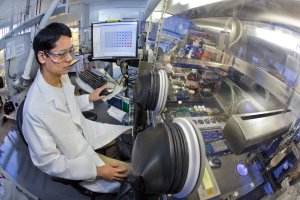Apr 26 2010
No longer attributable to human error-Berkeley Lab scientists have established a revolutionary nanocrystal-making robot, capable of producing nanocrystals with staggering precision. This one-of-a-kind robot provides colloidal nanocrystals with custom-made properties for electronics, biological labeling and luminescent devices.
This robotic engineer is named WANDA (Workstation for Automated Nanomaterial Discovery and Analysis) and was developed in collaboration with Symyx Technologies at the Molecular Foundry, a U.S. Department of Energy User Facility located at Berkeley Lab. By automating the synthesis of these nanocrystals, WANDA circumvents the issues facing traditional techniques, which can be laborious and are difficult to reproduce from one laboratory to the next. What's more, WANDA's synthetic prowess can help researchers sift through a large, diverse pool of materials for specific applications. Such a combinatorial approach has been used for decades in the pharmaceutical industry and now is being applied to nanomaterials at the Foundry.
 Emory Chan, with Berkeley Lab’s Molecular Foundry, directs WANDA, a revolutionary nanocrystal-making robot, to perform complex workflows that traditionally require extensive chemistry experience. (Photo by Roy Kaltschmidt, Berkeley Lab Public Affairs)
Emory Chan, with Berkeley Lab’s Molecular Foundry, directs WANDA, a revolutionary nanocrystal-making robot, to perform complex workflows that traditionally require extensive chemistry experience. (Photo by Roy Kaltschmidt, Berkeley Lab Public Affairs)
"WANDA makes nanocrystals of exceptional quality - every time - optimized for different applications," said Delia Milliron, Director of the Inorganic Nanostructures Facility at the Molecular Foundry. "We're providing these to users and now just starting to use WANDA to discover new nanocrystal compositions with advantageous properties."
WANDA's liquid-handling robotics prepare and initiate reactions by injecting nanocrystal precursor chemicals into an array of reactors. After a series of reactions is complete, the structural and optical properties of these nanocrystals can be screened rapidly, also using automated methods. WANDA is housed inside a nitrogen-filled chamber, designed to keep oxygen and water from interacting with reactive precursor chemicals and freshly formed nanocrystals. Since this robot is controlled by software protocols, novice users can direct WANDA to perform complex workflows that traditionally require extensive chemistry experience.
Milliron and her coauthors at the Foundry and University of California, Berkeley, have directed WANDA to produce and optimize a diverse set of nanomaterials under conditions analogous to those employed in traditional flask-based chemistry. Starting with widely studied and practically useful nanomaterials-such as cadmium selenide quantum dots, whose size can be adjusted to emit different colors of visible light-the team showed how WANDA can optimize the size, crystal structure and luminescence properties of different nanocrystals.
"This technology will change the way nanoscience research is performed," said Emory Chan, a senior scientific engineering associate at the Molecular Foundry. "Not only does WANDA enable the optimization and mass production of nanoparticles our users need, but this robot also facilitates experiments that give us a deeper understanding into the chemistry and physics of nanoscale materials."
A paper reporting this research titled, "Reproducible, high-throughput synthesis of colloidal nanocrystals for optimization in multidimensional parameter space," appears in the journal Nano Letters and is available in Nano Letters online. Co-authoring the paper with Chan and Milliron are Chenxu Xu, Alvin Mao, Gang Han, Jonathan Owen and Bruce Cohen.
This work was supported by DOE's Office of Science.